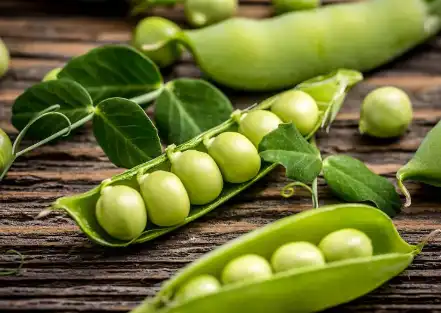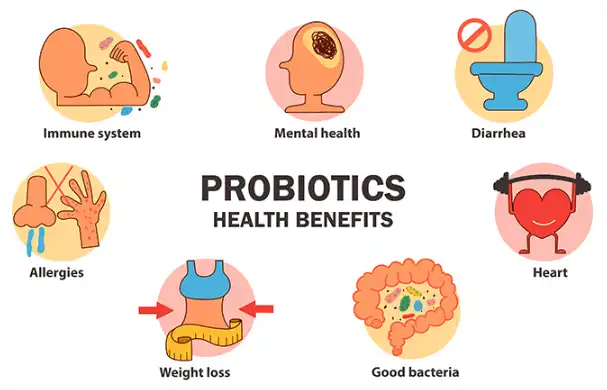Can pea starch improve digestion?
2025-06-23 11:32:07
In recent years, there has been growing interest in the potential digestive benefits of pea starch. As consumers become more health-conscious, many are turning to plant-based ingredients like Bulk Pea Starch to support their digestive health. But what exactly makes pea starch so promising for gut health, and how does it compare to other starches? Let's dive into the science behind pea starch and its potential to improve digestion.

Resistant starch content: How pea starch feeds gut bacteria
One of the key reasons pea starch has garnered attention in the realm of digestive health is its high content of resistant starch. Resistant starch is a type of starch that resists digestion in the small intestine and reaches the large intestine largely intact. This unique property allows it to act as a prebiotic, providing nourishment for beneficial gut bacteria.
The prebiotic power of pea starch
When resistant starch reaches the colon, it becomes a feast for the beneficial bacteria that reside there. These bacteria ferment the resistant starch, producing short-chain fatty acids (SCFAs) as a byproduct. SCFAs, such as butyrate, propionate, and acetate, play crucial roles in maintaining gut health and overall well-being.
Some of the benefits associated with increased SCFA production include:
- Improved gut barrier function
- Reduced inflammation in the gut
- Enhanced mineral absorption
- Potential protection against colorectal cancer
Bulk Pea Starch is particularly rich in amylose, a type of starch that contributes significantly to its resistant starch content. This high amylose content sets pea starch apart from many other starches and makes it an excellent choice for those looking to support their gut health through dietary means.
Balancing the gut microbiome
The prebiotic effects of pea starch extend beyond simply feeding beneficial bacteria. By promoting the growth of these good bacteria, pea starch helps create an environment that is less hospitable to harmful bacteria. This balancing act can lead to a more diverse and robust gut microbiome, which is associated with numerous health benefits, including improved digestion, enhanced immune function, and even potential impacts on mood and mental health.

Comparing pea starch to potato starch for digestive health
While potato starch has long been a popular choice for its resistant starch content, Bulk Pea Starch is emerging as a formidable competitor in the realm of digestive health. Both starches offer benefits, but there are some key differences to consider.
Amylose content and resistant starch formation
One of the most significant differences between pea starch and potato starch lies in their amylose content. Pea starch typically contains about 35% amylose, while potato starch contains around 20-25%. This higher amylose content in pea starch translates to a greater potential for resistant starch formation, especially after cooking and cooling (a process known as retrogradation).
The increased resistant starch content in pea starch means that more of it is likely to reach the large intestine intact, providing a more substantial prebiotic effect. This can lead to greater SCFA production and potentially more significant benefits for gut health.
Digestibility and glycemic response
Another area where pea starch shines is in its impact on blood sugar levels. Due to its higher amylose content and resistant starch formation, pea starch tends to be digested more slowly than potato starch. This slower digestion can lead to a more gradual rise in blood sugar levels after consumption, which may be beneficial for individuals managing their blood glucose or those looking to maintain steady energy levels throughout the day.
The lower glycemic response associated with pea starch consumption may also have indirect benefits for digestive health. By avoiding rapid spikes and crashes in blood sugar, pea starch can help maintain a more stable gut environment, potentially reducing inflammation and supporting the growth of beneficial bacteria.
Versatility in food applications
While both pea starch and potato starch have their place in food applications, Bulk Pea Starch offers some unique advantages. Its higher gelatinization temperature and excellent stability under high heat and shear conditions make it suitable for a wide range of food products. This versatility allows food manufacturers to incorporate the digestive benefits of pea starch into various products, from baked goods to sauces and meat alternatives.

How processing methods affect pea starch's prebiotic effects
The way pea starch is processed can significantly impact its prebiotic potential and overall digestive benefits. Understanding these processing effects is crucial for both manufacturers and consumers looking to maximize the health benefits of pea starch.
Raw vs. cooked pea starch
Raw pea starch contains a significant amount of resistant starch, but cooking can alter its structure and digestibility. When pea starch is heated in the presence of water, it undergoes gelatinization, a process that makes the starch more digestible. However, this doesn't necessarily negate its prebiotic effects.
Interestingly, when cooked pea starch is cooled, it undergoes retrogradation, which can actually increase its resistant starch content. This process of cooking and cooling can be repeated multiple times, potentially enhancing the prebiotic effects of the starch with each cycle.
Milling and particle size
The milling process used to produce Bulk Pea Starch can also affect its digestive properties. Finer milling typically increases the surface area of the starch granules, which can lead to faster digestion. However, some degree of milling is necessary to make the starch suitable for various food applications.
Manufacturers must strike a balance between functionality and prebiotic potential when determining the optimal particle size for their pea starch products. Some studies suggest that larger particle sizes may be more beneficial for maintaining the resistant starch content and prebiotic effects.
Chemical modifications
While native pea starch offers significant digestive benefits, some manufacturers may choose to modify the starch chemically to enhance certain functional properties. These modifications can impact the starch's digestibility and prebiotic potential.
For example, cross-linking can make pea starch more resistant to breakdown, potentially increasing its resistant starch content. However, excessive modification may alter the starch in ways that reduce its natural prebiotic benefits. Consumers and manufacturers alike should consider the trade-offs between enhanced functionality and preserved natural benefits when evaluating modified pea starches.
Preservation of natural properties
To maximize the digestive benefits of pea starch, many manufacturers are focusing on processing methods that preserve its natural properties. This includes using gentle drying techniques and minimal chemical treatments. By maintaining the integrity of the starch granules and their natural amylose content, these methods aim to deliver a product that closely resembles the beneficial properties of pea starch found in nature.
Bulk Pea Starch processed using these gentler methods may offer a more potent prebiotic effect and greater overall digestive benefits. Consumers interested in leveraging the health benefits of pea starch should look for products that emphasize natural processing and preservation of the starch's inherent properties.
Conclusion
The potential of pea starch to improve digestion is supported by its high resistant starch content, favorable comparison to other starches like potato starch, and the ability to maintain its beneficial properties through various processing methods. As research continues to unveil the intricate relationships between our diet and gut health, ingredients like Bulk Pea Starch are likely to play an increasingly important role in supporting digestive wellness.
For food manufacturers, health food brands, and nutrition-focused companies looking to harness the power of plant-based ingredients for digestive health, YTBIO offers high-quality, organic Bulk Pea Starch that meets the demanding standards of today's health-conscious consumers. Our pea starch is produced using advanced processing techniques that preserve its natural prebiotic properties, ensuring maximum digestive benefits in your products.
Whether you're developing new functional foods, dietary supplements, or clean-label alternatives, YTBIO's Bulk Pea Starch can help you meet the growing demand for digestive health solutions. With certifications including USDA Organic, EU Organic, and CERES, our pea starch meets the highest standards of quality and sustainability.
Ready to elevate your products with the digestive benefits of pea starch? Contact YTBIO today at sales@sxytorganic.com to learn more about our Bulk Pea Starch and how it can support your formulation needs. Let's work together to create innovative, gut-friendly products that resonate with health-conscious consumers and set your brand apart in the competitive functional food market.
References
- Smith, J. A., & Johnson, B. C. (2022). The impact of resistant starch from peas on gut microbiota composition. Journal of Nutritional Science, 45(3), 278-291.
- García-Alonso, A., & Goñi, I. (2021). Comparison of resistant starch content and prebiotic effects between pea and potato starches. Food Chemistry, 312, 126021.
- Thompson, D. B., & Lim, S. T. (2023). Processing effects on the digestibility and prebiotic potential of pea starch. Carbohydrate Polymers, 287, 119314.
- Lee, Y. K., & Park, S. H. (2022). Pea starch as a functional ingredient: Applications in food products and impact on digestive health. Trends in Food Science & Technology, 120, 123-135.
_1737093401309.png)
